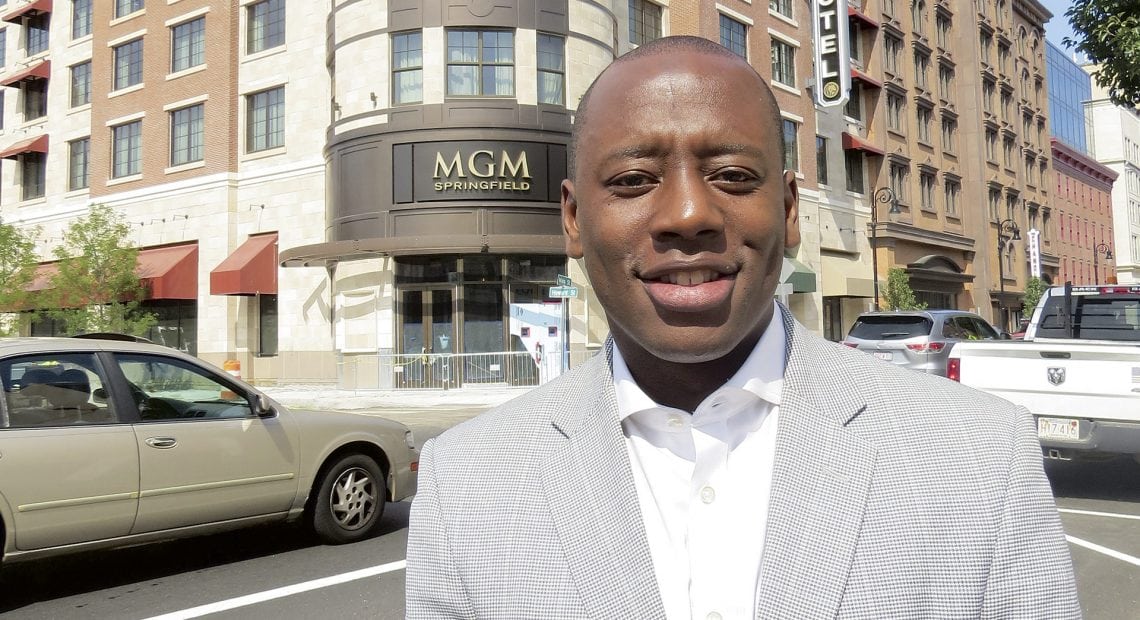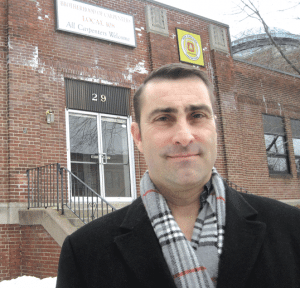The Final Countdown
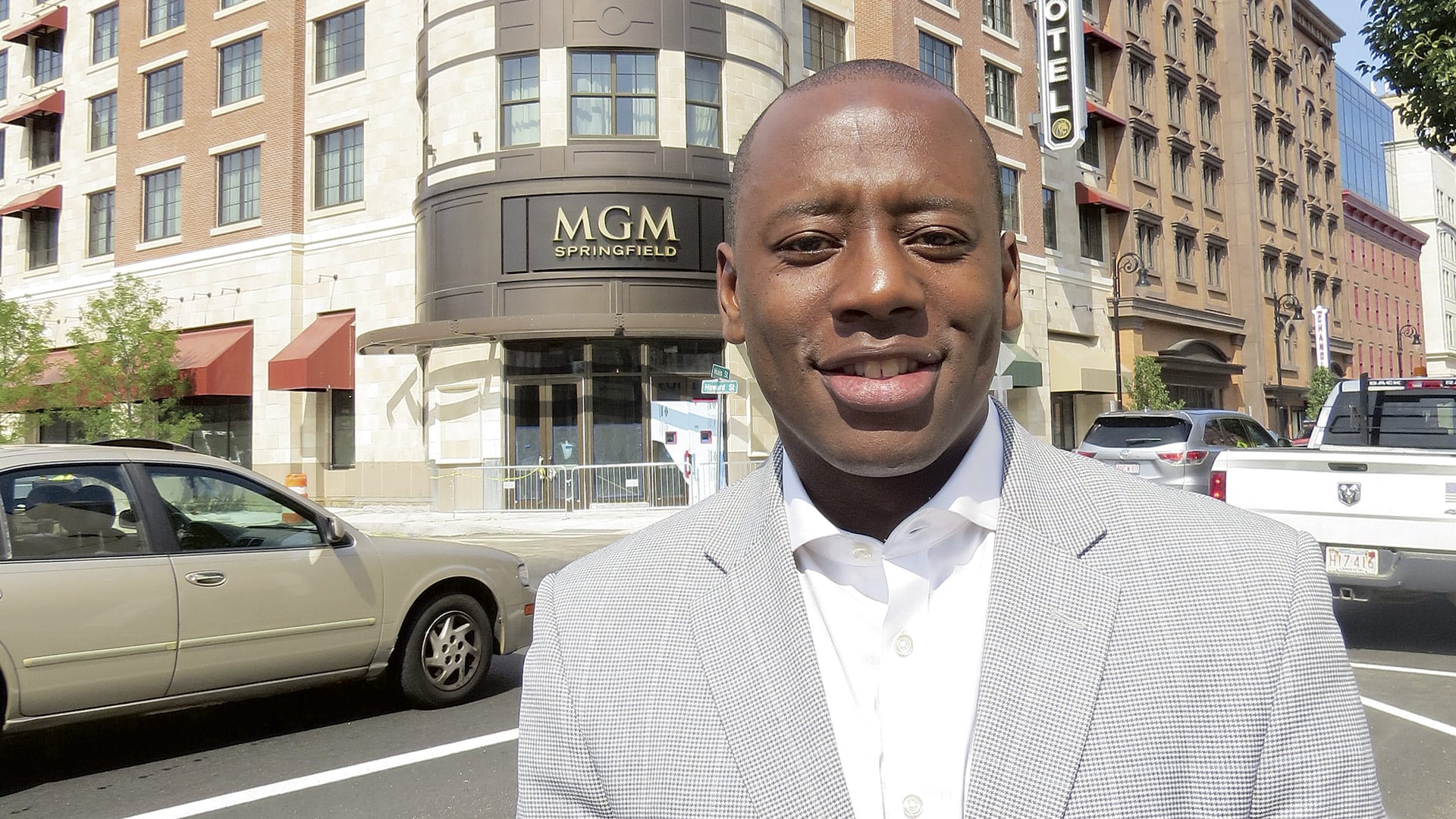
Alex Dixon stands just outside the entrance to the hotel at MGM Springfield, which is nearly ready for prime time and the Aug. 24 opening.
The almost decade-long process of opening the state’s first resort casino is entering its final days. There is a beehive of activity in Springfield’s South End, and that represents only what people can actually see. The process of not only opening the facility on schedule, but “making this place special,” as General Manager Alex Dixon described it, is humbling and exhilarating at the same time.
12,704.
That’s how many “discrete tasks” Alex Dixon said he and the ever-growing team at MGM Springfield must complete before the $950 million facility can open its doors to the public at 11 a.m. on Aug. 24.
12,704!
Not ‘more than 12,000.’ Not ‘12,700 or so.’
12,704. And you thought you had a lot of lines on your ‘to-do’ list.
“And those are just the things we thought about as we put together our critical paths,” said Dixon, general manager of MGM Springfield, who managed to find a few moments to speak with BusinessWest late last month (and he had to work hard at it). He couldn’t say how many of those tasks he and his team had drawn a proverbial line through, but he hinted strongly that, while considerable progress has been made, there were still quite a few (thousand) to go.
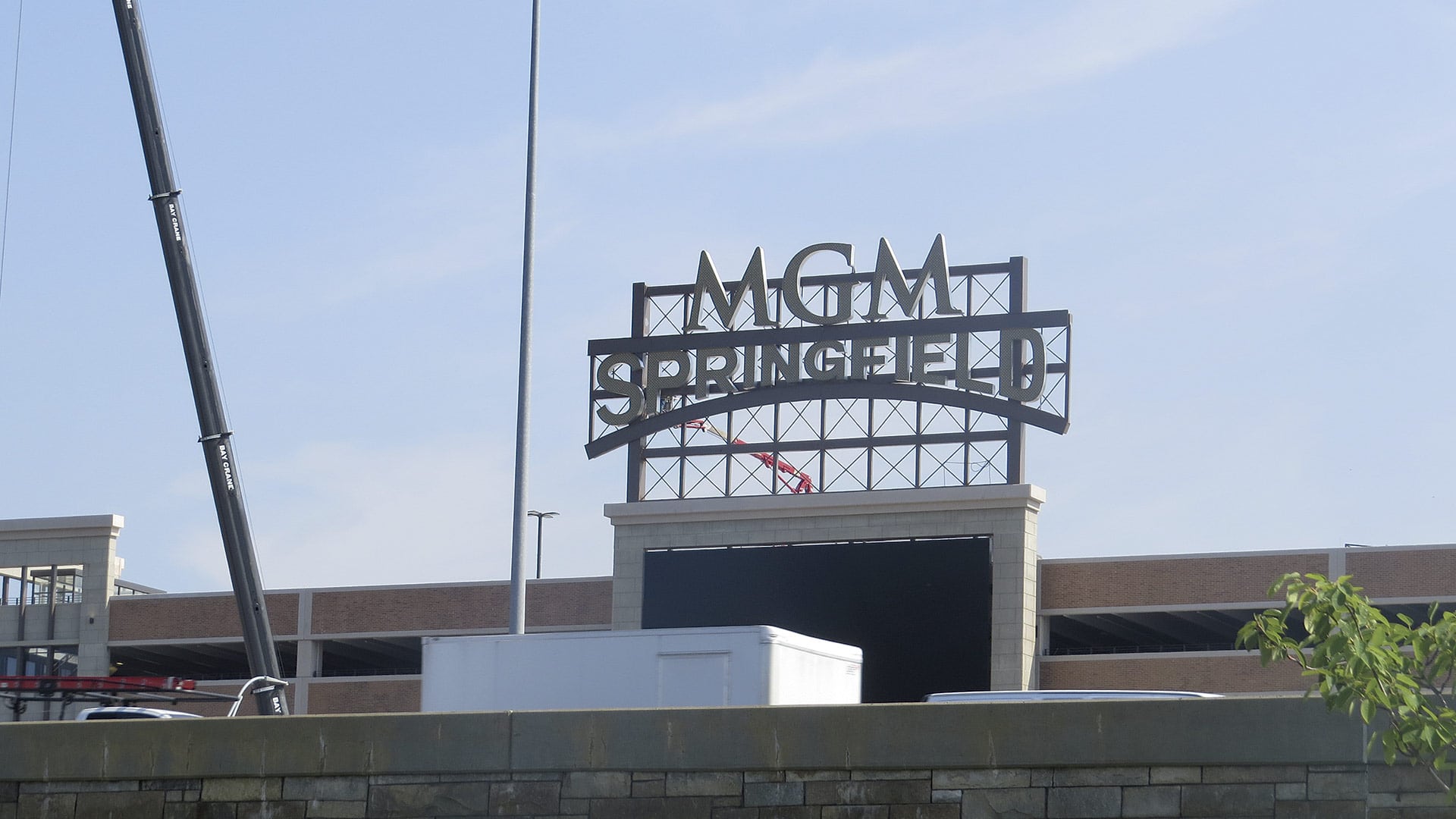
The giant MGM Springfield sign above the massive parking garage is the latest addition to the Springfield skyline.
But he also spoke with the utmost confidence about getting it all done, primarily because of the team that’s been put in place.
“When you think about the breakdown of those numbers, it’s a lot,” he said, putting heavy emphasis on that last word, not that he really needed to. “But we’ve got a great project-management process, we’ve done this before in other jurisdictions, we have a lot of people who are seasoned and know what they’re doing, and we have a very experienced and highly trained management team.”
As for those discrete tasks, they cover 45 different “work streams,” as Dixon called them, and 431 key milestones, many, if not most of them, already met. And they come in every size and shape, from having permits in place for each of the restaurants to meeting the required numbers for each of dozens of categories within the MGM Springfield workforce; from the thousands of items on the construction checklist to making sure the warehouse in Chicopee is stocked with everything it needs to be stocked with.
Overall, Dixon described the process of opening MGM on time — meaning with those 12,704 tasks completed and all licenses and permits and employees in place — as humbling, but also exciting and exhilarating. But he kept stressing that opening the doors on schedule is just one part of the story — and one part of the challenge.
Indeed, he said he’s not losing sleep worrying about getting everything done by Aug. 24. But what does keep him at night — sort of, but not really — are the other two main categories for all those discreet tasks: ‘the things that will make this a great customer experience’ and ‘how do we make this special?’
“We’ll open our doors at 11 o’clock on August 24 — that was never a question,” he explained. “We’re in ‘how do we make this place special?’ mode. We’re going to open, but we’re also going to have a great customer experience. The things that keep me up at night are making sure that we deliver on the promise of a phenomenal entertainment.
“You want to be unique, you want to stand out; I want to compete, and I want to win,” he went on, referring to the considerable competition MGM Springfield will face. “And our team does, too; that’s what motivates me, and it’s what motivates all of us.”
For this issue, one of the last in the pre-MGM era, BusinessWest talked with Dixon about the daunting process of opening the doors, and also about what will happen in Springfield on Aug. 24 and the days to follow.
He couldn’t — or at least he didn’t want to — make projections on how many people will come through the doors on opening day. But he expected the facility to reach full capacity (10,000 people in the casino) and for Springfield to see a day probably unlike any other in its history.
“There has been a tremendous amount of pent-up demand for some time now,” he said, referring to the almost-decade-long task of getting the state’s first resort casino up and running. “We are preparing to make sure that we can do our best to help satiate that demand on opening day.”
Task Masters
As he talked with BusinessWest about these final few days until opening, but also the long, character-building process of getting to this point, Dixon said MGM Springfield has essentially evolved from a startup company with a handful of employees (granted, one with a billion-dollar construction project unfolding around them) into one of the region’s largest employers.
The metamorphosis has come slowly and greatly accelerated over the past several months, to the point where it’s much harder for him to keep track of additions to the staff and putting names with faces. But the culture that was created when the company was a handful of people working on the ninth floor of Monarch Place, and later MGM’s headquarters on State Street, still prevails today.
“You walk through the hall, you meet a new face, and they may not know who you are,” he noted. “So the small things you did at the very beginning to build a great culture with that small group are important; we’re doing our best to make sure we have the right structures and processes in place to ensure that this culture emanates to the 3,000 we’ll be welcoming over the next few weeks.”
Together, this growing team is drawing lines through items on the ‘discrete tasks’ list, dozens, if not hundreds a day, said Dixon, adding, again, that the process of doing so is as exhilarating as it is daunting.
When asked what a typical day is like, he gave the expected answer — there is no such thing, or words to that effect.
But he said there are some common denominators, such as the starting time — 6 a.m. — with a daily briefing from MGM on news stories that impact the company and individual properties across the country.
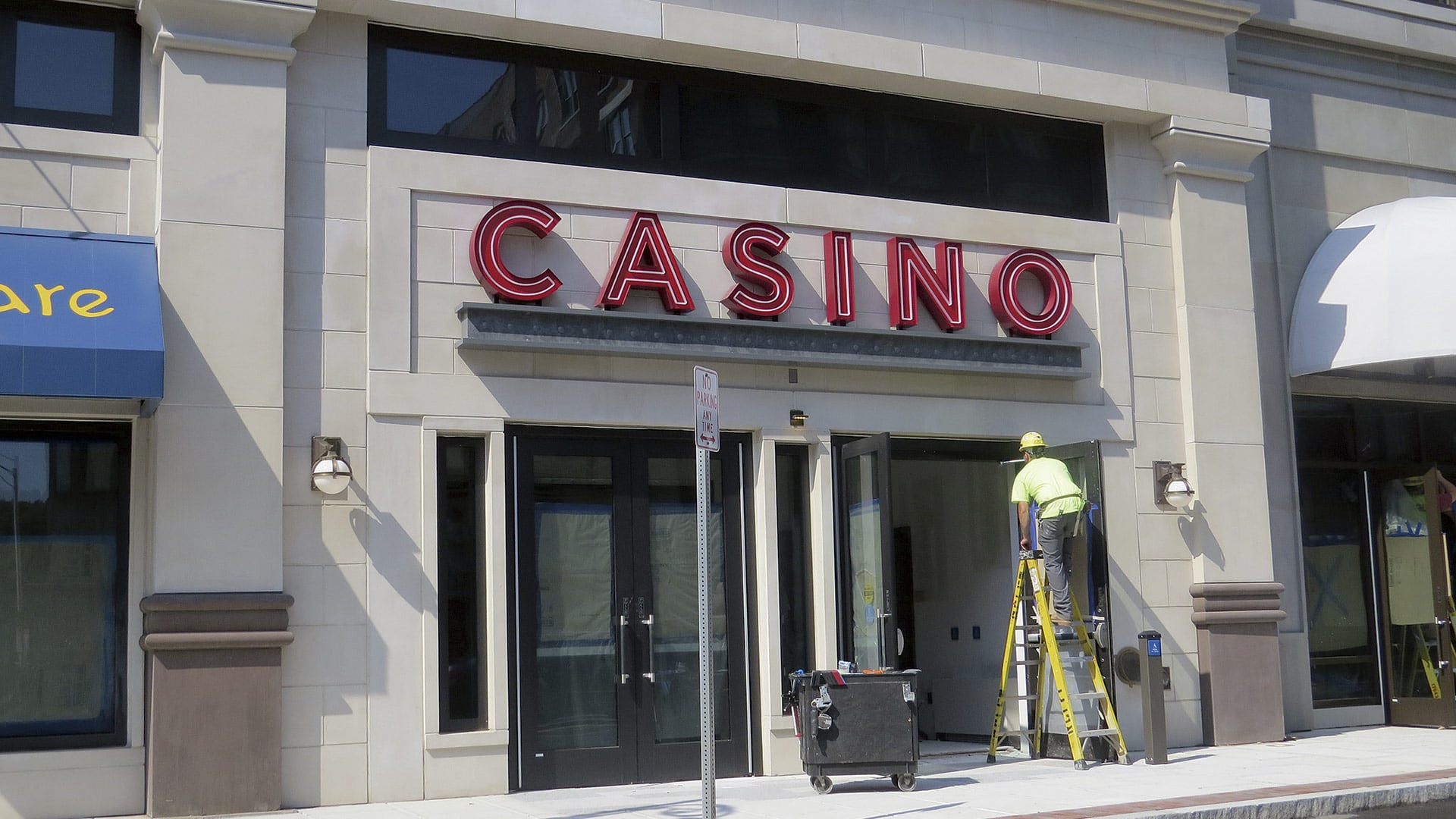
Alex Dixon says MGM has made great progress toward completing the 12,704 (and counting) tasks needed to get the casino and the rest of the complex open by Aug. 24.
“And as you can imagine, as of late, we’re driving a lot of news, especially with the properties in Las Vegas,” he told BusinessWest. “That’s always a great wake-up call; you read the news locally, but also read the news that’s impacting the business.”
From there, he’s often off to a meeting with one of the many groups he’s involved with within the community, such as the Greater Springfield Convention & Visitors Bureau’s executive committee breakfast session he attended the day he spoke with BusinessWest. He prefers to keep such community work in the morning so as to free up the remaining hours for his day job — or his long-day job, the way things are going.
When he talked with BusinessWest, Dixon referenced hour-long meetings with members of the executive team to address what he called ‘mission-critical items.’ Then, they were meeting three times a week. Soon (if not already), there will be a session a day.
“These are things we need to execute on,” he explained. “And it requires some degree of acceleration or just an intense level of focus to get us over the hump.”
Labor of Love
As an example, he mentioned “fallout” in a particular job category, a situation where the company is struggling to make hires. In such an instance, and there have been some, the team will work closely with the human-resources director and the leader of the department in question to ramp up efforts to address the situation.
Hiring is obviously one huge component of the process of getting things ready for Aug. 24, said Dixon, adding that 3,000 people have to be brought on board across several dozen different positions. But to get to 3,000, MGM actually needs to have a higher number of people in position to be hired, he explained.
“Once you make a job offer, there will be some people who just don’t show up,” he noted, adding that this is a hospitality-industry-wide issue, not something unique to MGM Springfield. “Just because you offer someone a job, they don’t really work until they show up that first day and get into their position.
“That’s the case across the board in many of our front-line positions,” he went on. “So what we’ve done, in some cases, is over-hire to account for some of that attrition, be it in security, beverage servers, or table-games dealers.”
But hiring covers only a portion of those 12,704 discrete tasks, said Dixon, who said they cover three basic “journeys,” as he called them — ‘customer,’ ‘employee,’ and ‘supplier’ — with the ultimate objective of earning an operating certificate from the Mass. Gaming Commission.
To get that certificate, MGM Springfield has a long list of things it has to satisfy in order to show that it is ready to welcome customers safely and appropriately — and also account for the revenue it is expected to generate for the state.
“This is a big business for the Commonwealth,” he explained. “Our regulators are on-site, and we have to satisfy a laundry list of things in order to prove we’re worthy of that operating certificate.”
He offered some examples:
• The casino must make sure the slot machines are “talking” to the central system monitored by the Gaming Commission to ensure the integrity of the games;
• All of the cameras must be approved by the commission to ensure that the operation has the appropriate oversight of the games and other areas within the complex;
• The commission also must approve the internal controls that MGM Springfield operates against so that the operation can be held accountable;
• The commission also makes sure the operation has all the needed licenses from local agencies, for everything from pouring alcohol to serving food; and
• The security plan must be approved to ensure the operation is adequately securing the facility as well as the Commonwealth’s assets.
It’s Getting Real
As opening day draws closer, the team at MGM will take the process of being ready to a different, higher level, said Dixon, referring to what he called ‘play days’ and other types of dress rehearsals for the real thing.
And these auditions will set the stage for what are known as ‘test nights’ (that will be publically announced), during which the operation’s performance will ultimately determine whether the state grants that coveted operating license.
“At those activities, we have to simulate what it is like to operate with real money and be able to perform these functions,” Dixon explained. “The Gaming Commission is assessing our ability to execute those functions in a controlled environment. That’s the big, substantive, last step before we are issued that operating certificate.”
As for what he’s seeing in Springfield now, as opposed to when he arrived 18 months ago, and what he expects to see after the casino opens, Dixon said there has been a metamorphosis there as well, especially when it comes to perceived attitudes about the casino.
“It’s been fascinating to see how things have shifted, from doubt in some cases — ‘is this really going to happen?’ — to ambivalence in other cases, to quietly watching, to trepidation, to what you see now, which is excitement.
“Whether you see people buying their tickets to see Stevie Wonder [who will appear at the MassMutual Center on Sept. 1] to people coaching up a son, daughter, niece, or nephew for an interview, or hearing the excitement of someone getting their first job or getting back into the workforce … it’s fascinating to see the progression.”
Meanwhile, he said that one doesn’t have to wait til Aug. 24 to witness the impact MGM Springfield is already having in Springfield’s downtown.
“If you walk along Main Street around noon, you see the streets teeming with people,” he noted. “They’re well-dressed, new haircuts, looking good, sharp — and friendly. You see the impact of 3,000 people, and we haven’t even onboarded everyone. You see the streets come alive with energy.
“Downtown has been defined by the absence of people after hours,” he went on. “Now, we’ll be defined by the presence of people; and this will be people from Springfield, but also surrounding communities, and people who haven’t been to Springfield in a while. I just can’t wait for people who will walk into our facility and walk into downtown Springfield and have this immense level of pride, not just in MGM, but in the city and the region.”
On Aug. 24, there will be a parade down Main Street an hour or so before the facility officially opens at 11 a.m., he said, adding that it will involve employees, dignitaries, and some entertainers from within the MGM family.
After that? He said National Harbor, the $1.5 billion casino in Maryland that MGM opened roughly 18 months ago, reached full capacity within hours of opening. And MGM is preparing for just such a contingency.
“Knock on wood, we can only hope we’ve got more demand than what we’re able to accommodate in the building,” he said, echoing a belief certainly shared by the city, the region, and the Gaming Commission.
Playing the Numbers
Getting back to his sleeping patterns as Aug. 24 draws closer, Dixon said there are obviously days when he rests better than others.
“The hours are getting shorter,” he said, adding, again, that the ever-growing team working draw lines through those 12,704 discrete tasks are working simultaneously on hundreds on individual assignments, but also the very big picture.
“It’s truly amazing; it takes every individual person on this team to take care of their silo, but also keep their head above water enough to look horizontally and make sure we’re coming together in a cohesive manner.”
It all about the journey, or journeys, Dixon said, adding that the plural is most definitely needed, as they work as a unit toward a common goal — not just opening the doors on time, but making the place special.
And that’s why this process is as exhilarating as it is daunting.
George O’Brien can be reached at [email protected]



